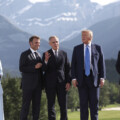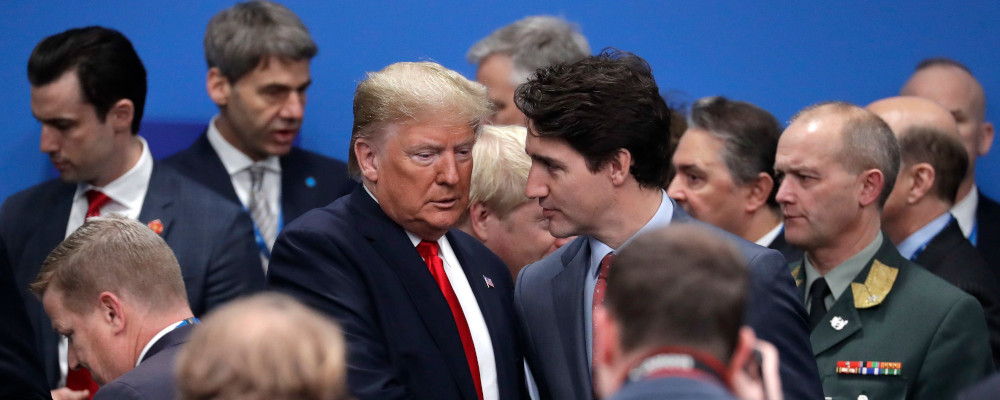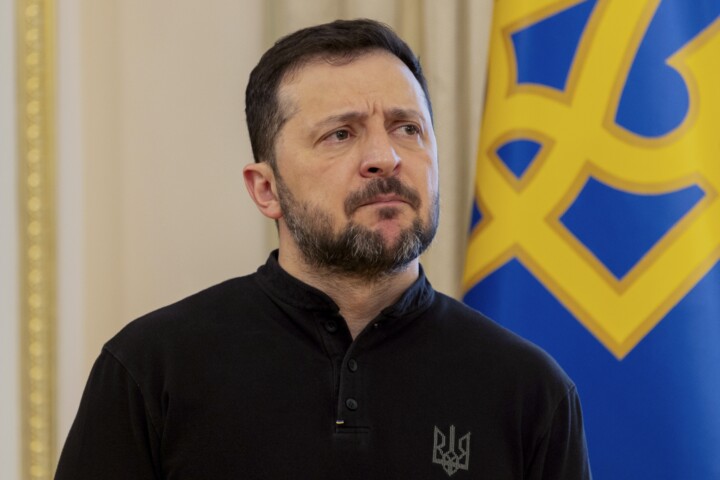Donald Trump’s win at the Iowa Caucuses and New Hampshire primary has cemented his front-runner status as the Republican Party nominee for the 2024 presidential election. It should not have been surprising, given the mass of polling that placed him quite aways ahead of his nearest competitor since the day he left office in 2022.
It is still a long way until November, however, and there’s no guarantee that Trump will win, or even be the nominee by then.Disqualifying him due to his actions on January 6th, 2021 via Section 3 of the 14th Amendment of the Constitution remains a distinct possibility. Current polling numbers suggest the presidential race is at best a tossup, but there are signs that improving economic numbers and candidate Trump’s personal legal troubles and statements may see a shift towards Biden in the coming weeks and months.
Nevertheless, the global community has started to prepare for the potential of a second Trump term. That certainly includes the government of Canada. As they do, it’s worth looking back to how Trump handled international relations in his first term.
The international community in an America First world
Trump’s election and subsequent first term was a profound shock to America’s long-standing allies. His mercurial decision-making, primarily transactional view of international relations, and willingness to overturn long-standing tenets of U.S. foreign policy offered few obvious strategies for how world leaders should navigate the turbulence.
Overall, Trump’s personal focus was less on threats to the international order and more on the financial burden imposed on the U.S. economy to maintain this order. Trade policy considerations took precedence over defence and security policy—even if these were used as fig leaves to justify the administration’s preferred trade policies. Trump was unafraid to use bellicose rhetoric, threats, and economic measures such as tariffs to achieve his America-First objectives. A former Reagan Administration official described it as a “grievance-based” foreign policy, emerging from Trump’s populist tendencies.
Some allies pivoted to this new reality more successfully than others. Shinzo Abe of Japan, for example, built up an excellent rapport with Trump and was able to avoid much of the acrimony faced by others, such as Chancellor Angela Merkel of Germany.
Canada’s approach to managing relations was the most multifaceted of all allies, reflecting the depth of the bilateral relationship between the two countries. It exploited existing connections to governors, congresspeople, and government officials to lobby their case where needed; an effective full-court press. The administration’s concerns with Canada were not mainly on defence, despite our lagging defence spending. Rather, Trump focused on trade and was insistent on renegotiating NAFTA, which resulted in the USMCA.
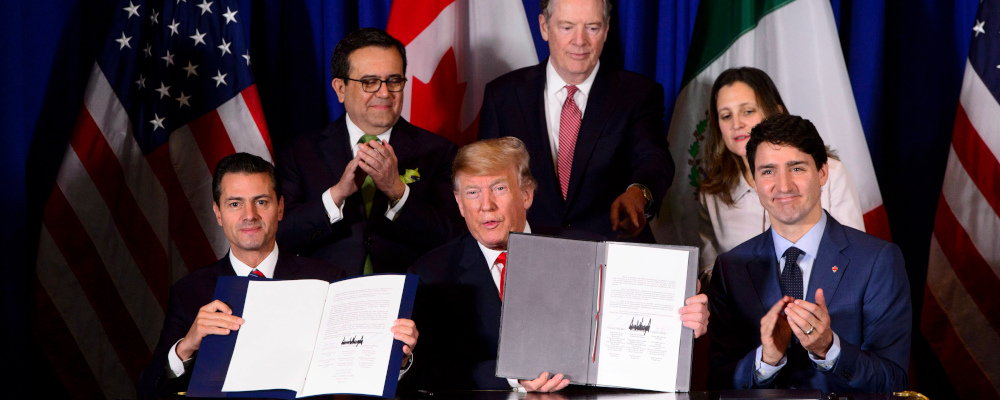
Biden’s different (but same) approach
Overall, Trump’s belligerent foreign policy damaged the reputation of the U.S. as a stalwart ally, something the Biden administration has dedicated significant effort to reverse. In practice, however, Biden’s foreign policy commitments have not differed all too greatly from Trump’s (even if not intentionally so).
The contours of his defence policy, especially around spending and program priorities are roughly the same. China has remained the largest threat through both administrations, though Biden has certainly treated Russia more adversarially, especially following the invasion of Ukraine. Yet, much like Trump and every other president since the Second World War, while Biden has also been concerned about burden sharing with America’s allies, the approach has differed more in leadership style than policy substance.
Certainly, Biden has been aided by a radically different international environment that pushed allies to look to the U.S. for leadership. Russia’s invasion of Ukraine and the increased Chinese action across Asia have awakened many countries to the direct threats to their security and prosperity, leading to significant increases in defence spending and more strident defence policies.
One of Biden’s most significant priorities has been to deepen defence relationships with close allies, and in ways that were much deeper than arrangements at the political level. In particular, his administration sought to foster defence-industrial cooperation between allies in order to draw them closer in alignment with the U.S.
Defence production relationships have a number of benefits over “regular” alliances—interoperability and interchangeability are major parts of them. Importantly, though, they provide ties beyond the purely political. Collaborative production schemes require large and constant investment, ensuring sustained future cooperation. As Ethan Kapstein pointed out recently, production arrangements also constrain policies between states in that they essentially bind their members’ foreign policies much more closely together and make it difficult for each to stray too far away.
Undoubtedly the clearest example of that is AUKUS, which draws the U.S., Australia, and the United Kingdom together into an arrangement that will provide Australia with the capacity to operate a nuclear submarine fleet, but will also promote innovation in defence technologies among the members.
The upshot if Biden is to hang on and win re-election, then, is that the world can expect more of the same: an America endeavouring to navigate multiple international crises by drawing closer to allies while also flexing its economic muscles to prod them into shouldering greater defence burdens, strengthening global security institutions, and attempting to constrain threats to its hegemony, whether they come from Russia, China, Iran, or elsewhere.

What if Trump wins?
This brings us back to a potential second term of the Trump administration.
First, it is important to note that a second term may not actually be very productive, considering the potential scenarios surrounding congressional control. It is not likely that Trump will enjoy control of both houses as he did during the first half of his first term. This would severely constrain his ability to get his agenda passed. Additionally, there’s a reason second presidential terms are commonly viewed as lame ducks. Presidents in this position tend to have less governing power as they get closer to their term limit, capping how much policy they can expect to successfully push through.
When it comes to foreign policy, a majority of individuals on both sides of the aisle see deep value in maintaining America’s alliances and will attempt to thwart any significant repudiation of them.
At the same time, Trump would almost certainly not attract the quality of staff required to run the government’s national security apparatus. The negative experiences of highly respected individuals involved in Trump’s first administration—like reported from John Kelly, James Mattis and H.R. McMaster—as well as allegations of unethical if not illegal requests, will likely warn off many potential officials from joining the administration. While the inexperienced individuals he does attract will almost certainly try to push a more radical policy agenda and a retreat from strong global leadership, they will also have to face a combative bureaucracy and a military that will be more vigilant of any potential transgressions.
Add it all up, and policy gridlock is much more likely to occur on any given issue.
Certainly, the world in 2024 has changed significantly from 2016, particularly in security and defence. America’s allies are more serious about the security challenges that are confronting them. Yet while allies’ defence spending has increased dramatically since the Russian invasion of Ukraine, it is doubtful it has risen enough to placate Trump. Expect the grievance-based feuds with allies to resume.
Still, given the groundwork laid by Biden in deepening America’s alliances and the likely gridlock that will stifle a second Trump term, the substance of America’s foreign and defence policies will shift less than one might predict.
What does this mean for Canada?
The major roadblock in the bilateral relationship between Canada and America under Trump was removed with the signing of the USMCA. Looking ahead, Ottawa’s lack of urgency on security matters, whether it be defence spending or foreign interference, is more likely to come to the fore.
Given that displeasure with Canada on this file is shared widely by politicians and senior officials of all stripes in Washington, we are unlikely to find many sympathetic ears there, regardless of who wins the 2024 election. Whether Trump or Biden occupies the White House next, then, the best thing Canada can do to manage our most important bilateral relationship is to start taking our defence and security responsibilities seriously.
Recommended for You

Four years since Russia’s invasion, Ukraine has learned some hard lessons—what about the rest of us?

‘A good speech—but not a lot is new’: Did Poilievre’s big speech on Trump, China, and the economy hit the mark?

DeepDive: Can we survive the journey to AI abundance?
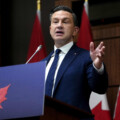
Poilievre stays the course on Trump—but is it enough?
